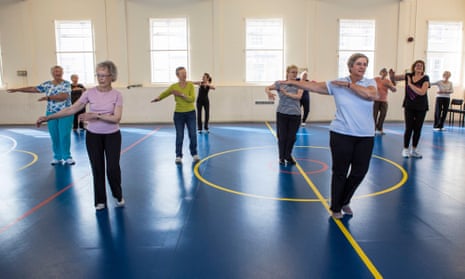Lately when I visit my mother, she’s always out. “At rehearsal!” she’ll text. “Come back after 5pm. Or another day.” She’s fallen in with a community choir, and is off the rails. Often they take her to the pub, and she doesn’t know when she’ll be back. Sometimes she leaves out a plate of falafel, in case I drop by to empty the fridge, like a reverse Santa Claus. But it’s unacceptable. And often dry.
At 80, she’s started going to Laban dance classes. She still plays in a drum circle, and now this, singing in an urban opera. For her, art is a reflex. She does things for their own joy, while still holding down a job. I’m the opposite. I made writing and performing my job; yet something in a creative identity can squash itself. Without the stamp of an agent, an audience, a platform or a deal, nothing I make would feel valid. I never wrote a word until I was paid, and I dream of retirement.
She’s more avant garde than me, in every way. I remember happier days, when she’d meet me at the door with something hot from the kitchen. “Spinach soldiers on speedboats” for example: vegetable croquettes standing to attention on half a baguette, with omelette netting. She’d make daal with chewy mango from snack packs. She had been working on a perfectly spherical meal. It involved stuffing a portobello mushroom with lingonberries, placing it within a bisected English muffin, and re-sealing it. She was this close to creating a Euclidean turducken, but moved on.
Where she expands, I contract. When my life as an actor entered a fallow period, I worried about being demoted to a hobbyist. What makes a real actor? Is it a measure of how often they get to do it, how good they are, whether they’re being paid? Is going to drama school like having tenure, a lifetime ratification? Actors are insecure, because they need permission to practise their art. It’s not so much a profession as an existential crisis in tights.
Determined to kidnap my mother, as well as find out what an urban opera actually is, I turned up to one of her performances. Our Street, it’s called, devised by the Lewisham Creative Chorus – a group more diverse in terms of age, ethnicity and background than any West End production could dream of. These things make a difference. “Salus populi suprema lex esto” began the show – an unsettling whisper from performers placed in the crowd. The wellbeing of the people is the highest law. Whispers became a chant, then morphed into one of the catchiest, most rousing songs I’ve ever heard. There were heart-stopping soloists, puppetry, poetry, snatches of Schubert. When my mother appeared centre stage, cradling a mannequin of a boy, clearly deeply moved, I burst into tears. I’d expected this to be sweet, but I hadn’t expected it to actually be good.
I’d envisioned amateur dramatics. Visions of retirees stumbling through The Importance of Being Earnest in a town hall, making nonsense of the lines amid a collapsing set. Where does that snobbery about amateur dramatics come from? If you are a creative and a child of Thatcher, you hang on to hierarchies that no one else cares about. It’s the only way to shore up a precarious self-image, with a cripplingly internalised worldview that says art is worthless unless it has economic value.
But we’re past that now. The sinking financial tide of these past decades has exposed the supporting beams involved in becoming a professional creative. Does anyone look at these “Thirty Under 30” lists, without realising most of them, without denying the obvious talent, could be re-titled “How Deep Is Your Safety Net”?
Most popular culture, especially for the young, is generated by what we once called amateurs. TikTok comedians, whose skits go viral. Soundcloud rappers and musicians who find critical acclaim. Bedroom-based makeup tutorials posted on YouTube shape how we look. Recipes from home chefs become staples, we buy art from artists who never went to art school, follow singers whose only qualification is being really good at singing. Social media may be bad for our health, but it is good at bypassing gatekeepers.
We need this bursting dam of talent more than ever. The rise of amateur orchestras, community choirs and dance groups arguably doesn’t need to be celebrated. It is the celebration.
I do think there’s something different happening than with TV shows like Britain’s Got Talent or The X Factor, where the big prize is still, ultimately, fame. There’s something about performers who do it for connection and community that breaks me open with joy. They put real life on the stage, more viscerally than professionals can. But art is not a competition, any more than it is a distraction, or a luxury for a privileged few. It’s our humanity, and it’s how we keep going. It’s why we keep going.
after newsletter promotion
Inspired, I resolve to unstitch my paralysis. My renaissance mother is not an artist because she trained, or gets gigs. She decided she is one, and lives accordingly. So I sit and write a short scene, for no one other than myself. It feels good. It feels alive. I guess I am my mother’s child after all. And now I’m hungry.
Lewisham Creative Chorus are raising money to put on a full version of their urban opera. You can support them here. (I’d be grateful, as I’m hoping my mother moves on from this and gets back to my dinners. For Mother’s Day she gave me pigs in blankets.)
Follow Rhik on X @whatsamadder

